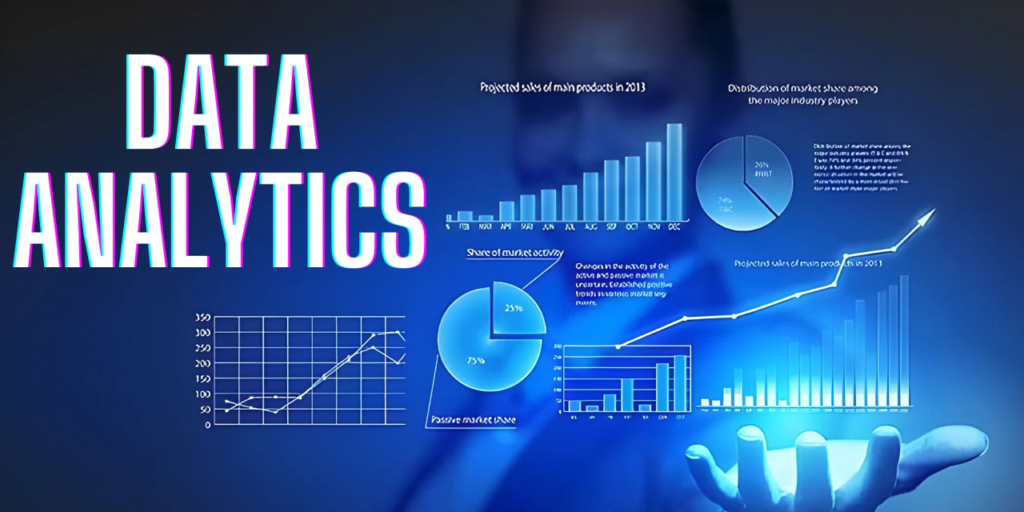
Boost Your Career with Data Analytics:
In today’s fast-paced, data-driven world, career success is no longer just about hard work and experience—it’s also about making smart, informed decisions. From small startups to multinational corporations, every business depends on data to guide strategies, improve efficiency, and create better customer experiences.
But here’s the catch: while businesses are drowning in data, they lack enough skilled professionals who can analyze and interpret it effectively. This gap has made data analytics one of the most in-demand skills across industries.
So, how can you leverage this opportunity? The answer is simple: by enrolling in a data analytics course. Whether you’re a student, a working professional, or an entrepreneur, learning data analytics can significantly boost your career. Let’s explore why.
The Rising Importance to boos your Career in Data Analytics
The phrase “data is the new oil” has become more than just a buzzword—it’s the reality of today’s economy. Organizations rely on data to:
-
Understand customer behavior.
-
Forecast sales and revenue.
-
Optimize operations.
-
Reduce risks and losses.
-
Make informed, strategic decisions.
Industries like finance, healthcare, marketing, retail, manufacturing, and even sports are using data analytics to stay ahead of the competition. With the explosion of big data, cloud computing, and AI, the demand for skilled analysts is growing at an unprecedented rate.
According to LinkedIn’s “Jobs on the Rise” report, data analytics ranks among the top 10 most sought-after skills globally. This means professionals who equip themselves with analytics skills are more likely to secure stable, high-paying jobs in the future.
Benefits of Learning Data Analytics for Career Growth
So, how exactly does a data analytics course benefit your professional journey? Let’s break it down.
1. High Demand Across Industries
One of the biggest advantages to boost your career with Data Analytics is its universal applicability. Unlike some skills limited to specific sectors, analytics is required in almost every industry.
-
Healthcare uses analytics to improve patient outcomes.
-
E-commerce relies on it for personalized recommendations.
-
Finance uses it to detect fraud and manage risks.
-
Marketing professionals use analytics to track campaign performance.
This widespread demand means that once you learn analytics, you can explore multiple industries without being tied to a single domain.
2. Better Career Opportunities & Higher Salaries
Organizations value professionals who can turn raw data into actionable insights. As a result, roles in data analytics often come with competitive salaries and excellent growth opportunities.
Popular job roles include:
-
Data Analyst – cleaning, interpreting, and visualizing data.
-
Business Analyst – bridging data insights with business strategies.
-
Data Scientist – applying advanced algorithms and machine learning.
-
BI (Business Intelligence) Analyst – creating dashboards and reports.
Reports show that data analytics professionals can earn salaries 20–30% higher than many traditional IT and business roles, making it a financially rewarding career path.
3. Informed Decision-Making Skills
Even if you’re not in a technical role, understanding data helps you make better decisions to boost your career with Data Analytics. For example:
-
A marketing manager can allocate budgets more effectively using campaign data.
-
An HR professional can analyze employee performance and retention trends.
-
A sales executive can forecast demand and set realistic targets.
Learning analytics doesn’t just make you a “data person”—it sharpens your critical thinking and problem-solving skills, which are highly valued in any profession.
4. Freelancing & Consulting Opportunities
Not everyone wants a 9-to-5 job. The good news is, data analytics also opens doors for freelancing and consulting.
Small businesses often struggle with analytics but are willing to hire part-time consultants. As a skilled professional, you can:
-
Offer freelance services on platforms like Upwork, Fiverr, and Toptal.
-
Work with startups to analyze customer data and optimize growth.
-
Consult entrepreneurs on making data-driven decisions.
This flexibility allows you to create multiple income streams and even build a personal brand as a data expert.
5. Adds Value to Your Existing Role
A data analytics course doesn’t mean you have to change careers completely. Instead, it can enhance your current role.
-
Finance professionals can use data to predict market trends.
-
HR managers can track employee engagement and hiring effectiveness.
-
Operations managers can reduce costs by analyzing supply chain data.
No matter your field, being data-savvy makes you more valuable and gives you an edge over colleagues who rely only on intuition.
6. Future-Proof Your Career
The workplace is changing rapidly with automation and artificial intelligence. Jobs that don’t require specialized skills are at higher risk of being replaced. However, data analytics is a future-proof skill.
Why? Because businesses will always need professionals who can interpret data, create insights, and make strategic decisions. A data analytics course ensures you stay relevant in the digital economy for years to come.
How a Data Analytics Course Helps You Learn Faster
You might wonder: “Can’t I just learn analytics on YouTube?” While self-learning is possible, a structured data analytics course offers unique advantages:
-
Organized Curriculum: Courses guide you step-by-step, from basics to advanced concepts.
-
Hands-On Projects: Real-world case studies and datasets prepare you for practical challenges.
-
Certification: Recognized certificates strengthen your résumé and LinkedIn profile.
-
Career Support: Many courses offer mentorship, career counseling, and placement assistance.
This structured approach saves time, keeps you accountable, and ensures you gain job-ready skills instead of just scattered knowledge.
Who Should Learn Data Analytics?
One of the best parts about data analytics is that it’s not restricted to IT professionals. Almost anyone can benefit, including:
-
Students: looking for a future-proof career path.
-
Working professionals: in IT, marketing, HR, finance, or operations.
-
Entrepreneurs: who want to use data to grow their businesses.
-
Freelancers: aiming to add an in-demand service to their portfolio.
If you work with information, decisions, or customers—learning analytics will help you perform better.
How to Get Started with a Data Analytics Course
Ready to begin? Here’s a simple roadmap:
-
Choose the Right Course to Boost Your Career with Data Analytics
-
Look for courses that teach both fundamentals (Excel, SQL) and advanced tools (Python, Tableau, Power BI).
-
-
Learn the Tools
-
Excel & SQL for basics.
-
Python/R for advanced analysis.
-
Tableau/Power BI for data visualization.
-
-
Practice with Real Data
-
Use free datasets from Kaggle, Google Dataset Search, or government portals.
-
Try solving business problems with the data.
-
-
Build a Portfolio
-
Create dashboards, reports, and case studies.
-
Upload them on GitHub or LinkedIn to showcase skills.
-
-
Stay Updated
-
Data analytics is evolving—keep learning AI and machine learning basics to stay ahead.
-
Conclusion
Data analytics is more than just a technical skill—it’s a career accelerator. In a world where businesses are driven by data, professionals who can analyze and interpret data hold the key to better jobs, higher salaries, freelancing opportunities, and long-term career security.
By enrolling in a data analytics course, you not only gain technical knowledge but also develop problem-solving, decision-making, and strategic thinking skills that set you apart in any field.
So, whether you’re a student stepping into the job market, a professional looking to upskill, or an entrepreneur aiming to scale your business—data analytics can be the turning point in your career.
Start today, and let data open the doors to your future success.



